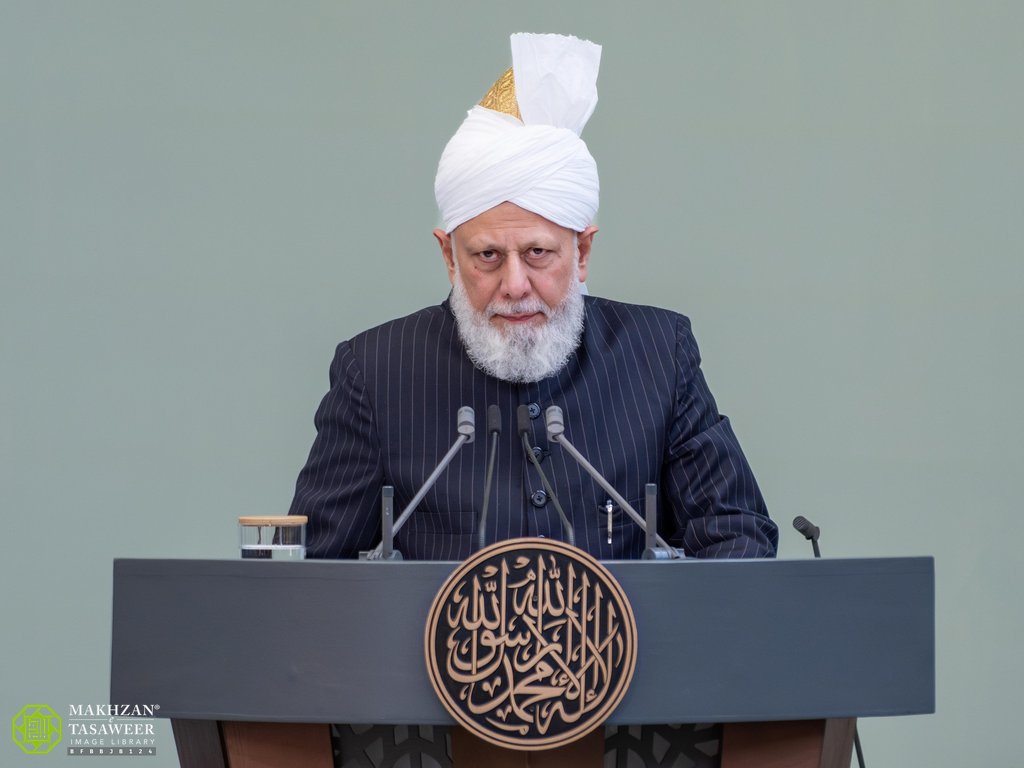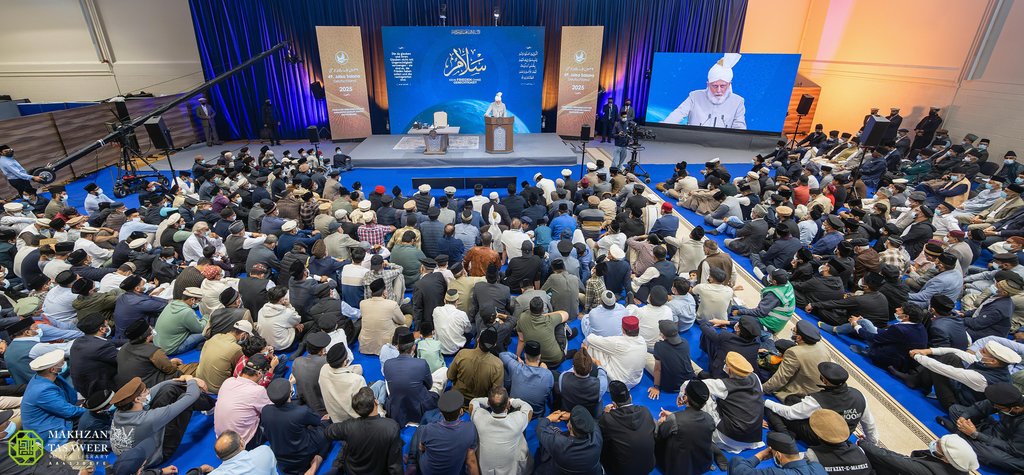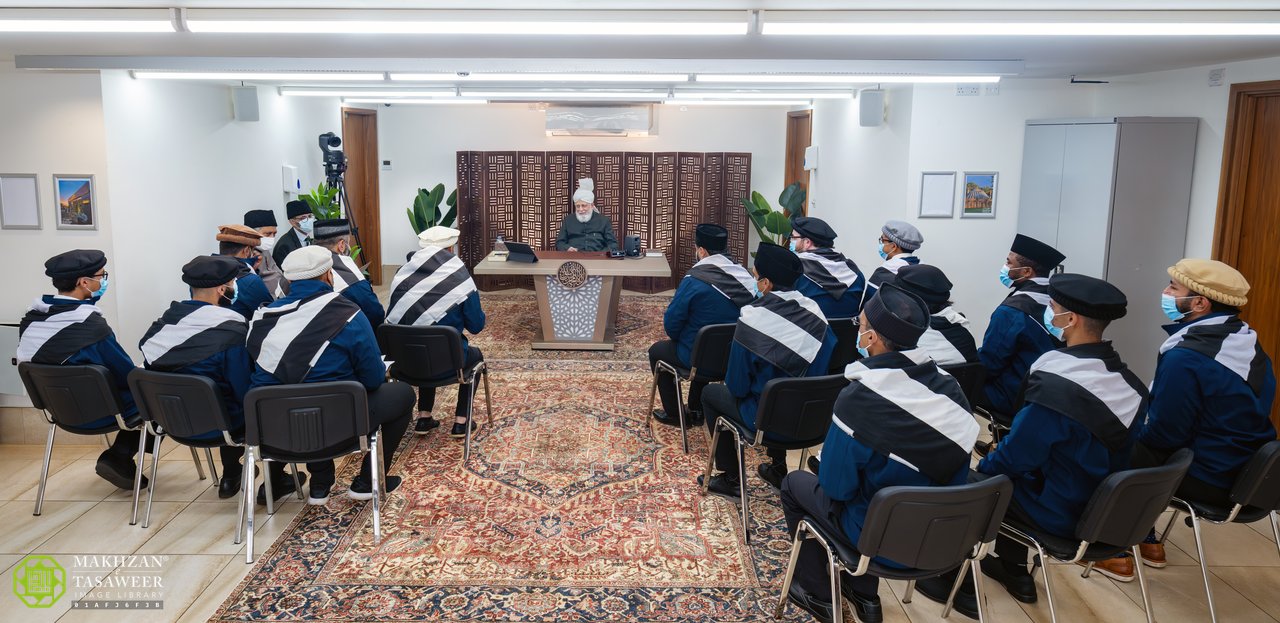
World Wide Head of the Ahmadiyya Muslim Community Highlights the Power of Obedience and the Role of Women in Times of Crisis
“Responding immediately to the call of a Prophet is an essential duty – in fact, it is one of the greatest signs of true faith” – Hazrat Mirza Masroor Ahmad
During his weekly Friday Sermon on 5 September 2025, the Worldwide Head of the Ahmadiyya Muslim Community, His Holiness Hazrat Mirza Masroor Ahmad once again narrated and elaborated upon various incidents in early Islam. In particular, His Holiness explained the circumstances of the Battle of Hunain and the honourable conduct of the Holy Prophet Muhammad (peace and blessings be upon him) and his companions.
The Battle of Hunain took place when several Arab tribes, unsettled by the growing influence of Islam, united to launch a surprise attack against the Muslims. As the Muslims advanced through a valley, they were ambushed by thousands of archers hidden in the surrounding hills. This sudden assault caused momentary chaos and disarray among the Muslim ranks.
His Holiness emphasised that it was important to note that the Muslims had not started the conflict, and that the battle was fought in self-defence against a premeditated and coordinated enemy attack.
Through the courage of the Holy Prophet Muhammad (peace and blessings be upon him) and the eventual regrouping of the Muslims, the Muslims overcame the ambush and achieved a decisive victory. His Holiness emphasised the importance of instant obedience to divinely appointed leadership.
Hazrat Mirza Masroor Ahmad stated:
“Responding immediately to the call of a Prophet is an essential duty (for a Muslim) – in fact, it is one of the greatest signs of true faith.”
His Holiness also narrated the moment when the Muslims, despite being in large numbers, briefly fell into disarray during the surprise attack at Hunain, and how the Holy Prophet’s call alone reignited their resolve.
Whilst narrating this, Hazrat Mirza Masroor Ahmad also highlighted the exceptional bravery shown by Muslim women during the battle, especially Hazrat Umm Sulaim (ra), who was pregnant at the time and yet fully committed to the defence of Islam. His Holiness went on to recount the remarkable courage of Hazrat Umm Sulaim (ra) and mentioned her unwavering resolve in the face of danger. He also spoke of other noble women such as Hazrat Umme Ammarah (ra) who stood alongside the Muslims and played a vital role in defending their faith.
His Holiness narrated a story that shows the forgiving and loving nature of the Holy Prophet Muhammad (peace and blessings be upon him) even towards his opponents. During the Battle of Hunain, a man named Shaybah ibn Uthman who had outwardly accepted Islam and was amongst the Muslim army, had secretly planned to assassinate the Prophet Muhammad (peace and blessings be upon him) during the chaos of fighting.
God revealed to the Holy Prophet (peace and blessings be upon him) the man’s hidden intentions. As the man drew close and drew with his drawn weapon, the Holy Prophet (peace and blessings be upon him) reached out his hand, placed it on the man’s chest, and prayed:
“O God, free him from satanic thoughts and remove the hatred from his heart.”
Shaybah later recounted, “In that instant, I felt that nothing in the world was more beloved to me than the Prophet.” His hatred melted away, replaced by deep love and loyalty. Such was the transformation of his heart.
After the battle, Shaybah ibn Uthman visited the Holy Prophet (peace and blessings be upon him) in his tent. The Prophet reminded him gently, “O Shaybah, what you are now and what God has destined for you now is far better than what you were when you had those thoughts during the battle.” Shaybah asked for forgiveness for his past intentions. The Prophet prayed for him, saying: “May Allah forgive you.” It was a demonstration of how Islam and the teachings of the Holy Prophet Muhammad (peace and blessings be upon him) transformed the lives and conduct of countless people – bringing them towards peace and compassion.

